SWEDISH SOUTH ASIAN STUDIES NETWORK
Department of Government, Uppsala University:
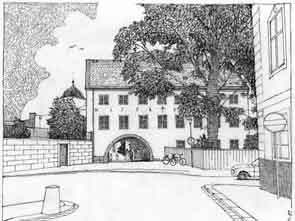 Postal
address: Box 514, 751 20 Uppsala
Postal
address: Box 514, 751 20 Uppsala
Visiting address: Theatrum Oeconomicum, Gamla Torget 2
Telefax: +46 (0)18 471 33 08
Web page: http://www.statsvet.uu.se/
Contact persons:
Associate professor Hans
Blomkvist, phone +46-18 - 471 33 32. Personal web page with
information on his research,
publications and teaching.
Professor in Comparative Politics Sten Widmalm, phone +46-18 - 471 33 36. Personal web page with information on his doctoral thesis, articles, reports and research.
The Department of Government studies every aspect of political life – from the ideas of ancient thinkers to the decision-making of today. The problems of democracy are dealt with from the point of view of classical theory and contemporary debate. Comparative studies of foreign countries, systems of government and politics are also done. Moreover, the interplay between states at the global political arena is studied at the department. The Uppsala Chair in Eloquence and Government was established in 1622 by Johan Skytte, the first Chancellor of Uppsala University. It is said to be one of the oldest, still active, professorships in Political Science in the world today.
Ongoing research connected to South Asia:
Hans Blomkvist and Sten Widmalm are among the leading South Asia scholars in Sweden, and has produced lots of research material over the years, which can be studied at their respective personal web pages mentioned above.
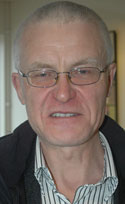
Hans Blomkvist
(photo to the right) has been engaged in a Sida/SAREC funded research project on Democracy
and Social Capital in Segmented Societies, studying differences
in the type of civil society (viz. level of social capital) in South Africa
and India; and whether these can explain environmental protest and government
performance. The project also involved Per Nordlund
within the same department and Ashok Swain,
Dept. of Peace and Conflict Research, Uppsala University, besides a large
number of researchers in South Africa and India. More
information.
The Indian researchers have been: Aswini Ray, Niraja
Gopal Jayal, Bishnu Mohapatra, Sudha
Pai, and Dwaipayan Bhattarcharyya,
at the Centre for Political Studies, Jawaharlal Nehru University, New
Delhi; and Amareswar Mishra, Madhusmita
Mishra, Srinabas Pathi, Brahmananda
Sathapathy, and Smita Nayak from the
Dept of Political Science, Utkal University, Bhubaneswar.
The project was born out of a previous research project, The
Agora Project: Democracy and Social Capital in Segmented Societies,
completed in 2002. More
information on this.
Dr.
Blomkvist is now working with a research programme on institutions and bioenergy in Europe and India, ”Bioenergy, institutions and interest groups: Explaining energy systems in southern Indian
states”. The project is funded by the
Swedish Energy Agency (Energimyndigheten), and is carried out in collaboration with Dr. Katrin Uba from the same department (more information about Dr. Uba), and a number of researchers from the fields of science & technology, namely Yvonne Brandt Andersson, Christina Edström, Mats Leijon, and Roland Roberts. ![]()
Abstract: Growing concerns about a global energy crisis and climate change are set against the background
of an 80 per cent dependence on fossil fuels. A second crucial factor is the rapid economic growth
in China and India, having 30 per cent of the world’s population. Energy use in India is estimated
to grow by close to 3 per cent annually 2004-2015, almost two and a half times as rapidly as in the
OECD. Bioenergy has been projected as one of the important remedies to the twin challenges of
energy shortage and climate change. Presently energy from biomass and waste covers more than
a third of India’s energy use, but almost all of it represent “traditional” burning of wood fuel,
agricultural waste and dung. But the contribution to electricity production in India from biomass
and waste is projected to grow by 20 per cent annually 2004-2015.
Energy belongs to the ‘concurrent list’ in India, meaning that the political responsibility is shared
between the federal government in New Delhi and 35 states and union territories. This paper will
probe into the policies of energy and renewable energy – particularly bioenergy – at the central
(federal) and state level in India. Three states will be in focus and compared: Andhra Pradesh,
Kerala, and Tamil Nadu. All three have a relatively standard of living and are governed
relatively well, but they differ conspicously in terms of renewable energy used: Tamil Nadu with
22 %, Andhra Pradesh with 5 % and Kerala with only 1 %. What can explain these differences?
Sten
Widmalm wrote his doctoral thesis on ”Democracy
and violent separatism in India : Kashmir in a comparative perspective”
in 1997 (read
an abstract of the dissertation). An updated version of the thesis
has again been published as a book titled ”Kashmir in
Comparative Perspective – Democracy and Violent Separatism in India”
by Oxford University Press in March 2006 (with foreword written by Ian
Talbot). More
information on the new book.
Prof. Widmalm is the Director for Uppsala University’s Master's
programme in Development Studies. The programme is run by the Department
of Government, but with the aid of researchers and lecturers at a number
of different educational institutions. It gives preparation for a professional
career as an investigator and analyst in both the private and the public
sector both nationally and internationally. More
information about the programme.
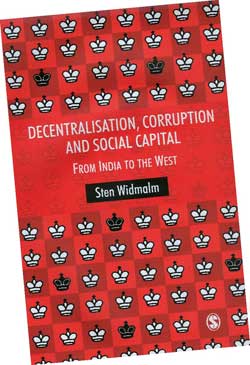 Sten Widmalm has also been engaged in a research project
on ”Everyday
Corruption in India”,
carried out in the Indian states of Madhya Pradesh and Kerala, and
a project on ”Decentralisation
and Development: The effects of the devolution of power on health
and education in India.” Information
on the project.
Sten Widmalm has also been engaged in a research project
on ”Everyday
Corruption in India”,
carried out in the Indian states of Madhya Pradesh and Kerala, and
a project on ”Decentralisation
and Development: The effects of the devolution of power on health
and education in India.” Information
on the project.
In January 2008, Dr. Widmalm published the results of his research in a new book titled ”Decentralisation, Corruption and Social Capital. From India to the West” (SAGE Publications).
Abstract: The book provides fresh perspectives and insights on what may be the world’s largest ongoing
decentralisation reforms—the Panchayat Raj reforms in India – and presents unique empirical material
from Madhya Pradesh and Kerala.
Comparative perspectives and references to historical cases from
around the world are used to show how decentralisation can be connected to social capital and
corruption. In particular, this book shows how certain forms of social capital, previously thought to be a
hindrance to development, can work in favour of democracy.
Widmalm argues that there exists a strong and direct connection between degrees of corruption in
village performance and the level of trust in society, even though only an ambiguous link can be said to
exist between decentralisation and corruption. However, the kind of trust most strongly related to
performance is not the kind we would expect from a reading of development literature or from the
policies of certain aid agencies. This book shows that the relationship between decentralisation,
corruption and social capital can be well understood if illuminated through the prism of collective action
theory. Further, it dwells upon the consequences of these research results for aid policies.
The book would be invaluable to aid
agencies and development-oriented organisations, as well as students and researchers working in the
areas of development, governance, decentralisation, federalism, social capital and civil society. More information.
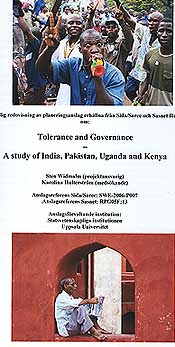 Besides, Sten Widmalm has been involved in a another
India related project, a comparative project focusing on
tolerance among citizens in India and Uganda. In 2005 he published an article called ”Trust
and Tolerance in India – Findings from Madhya Pradesh and Kerala”
in the peer-reviewed magazine India Review (Issue 3-4, 2005). More
information.
Besides, Sten Widmalm has been involved in a another
India related project, a comparative project focusing on
tolerance among citizens in India and Uganda. In 2005 he published an article called ”Trust
and Tolerance in India – Findings from Madhya Pradesh and Kerala”
in the peer-reviewed magazine India Review (Issue 3-4, 2005). More
information.
In February 2006 Prof. Widmalm received a SASNET
planning grant for a project called ”Tolerance
in Challenging Political Environments in Uganda, Kenya, India and Pakistan”,
to be carried out together with the Africa expert Dr. Karolina
Hulterström, then also at the Dept. of Government (now, 2009,
working at Sida in Stockholm). The planning grant was used for carrying
out a preparatory visit to India and Pakistan (a planning grant for the
pilot survey in Uganda and Kenya was given bySida/Sarec).
Research partners in South Asia have been Dr. Sarwar
Bari Pattan, Islamabad,
Pakistan; Dr. Yogesh Kumar, Director for
Samarthan, Bhopal, Madhya Pradesh, India; and Professor Raman
Kutty, Health Action
by People, Thiruvananthapuram, Kerala, India.
In October 2009, Prof. Widmalm was awarded main funding for this project on ”Freedom of Expression and Tolerance
in Challenging Political Environments in Uganda, Kenya, India and Pakistan”, when it was awarded SEK 3.9 m as a three-years grant for the period 2010-12 from the Swedish Research Council for
research within the fields of Humanities and Social Sciences. More information. ![]()
Project abstract: This is a study of political tolerance in India, Pakistan, Kenya, and Uganda. The project will focus on tolerance of the kind we associate with civil liberties and rights – liberties and rights that from a democratic perspective should belong to all citizens irrespective of race or ethnicity, gender, class, or, most important, opinion. We will consider the value which citizens place upon these liberties and what explains the variation in citizens’ levels of political tolerance. By means of surveys and in-depth interviews in all four countries, which vary in type of regime on a scale ranging from “democratic” to ”very weak democratic”, the project will test a set of hypotheses relating mainly to civil society, gender, type of regime, quality of governance, ethnic pluralism, and socioeconomic conditions. In particular, the project aims at investigating the possible influence of institutional factors and cultural values and traditions. The aim is to test the idea that state institutions that provide services (e.g. health services, education, judicial support) according to universalistic principles always contribute to political tolerance (measured as the support for the freedom of expression) no matter how plagued the cultural and political context may be with regard to lack of trust, ethnic divides, and socioeconomic inequalities.
On 5 March 2010, the same project was also awarded SEK 2.1 M as a project grant from the Swedish International Development Cooperation Agency, Sida. The grant is given for the period 2010–12. ![]()
Associate Professor Suruchi
Thapar-Björkert joined the Department of Government in April 2010, as a Senior Lecturer. Her research interests focus on four main areas: 1) gender, nationalism and colonialism; 2) the political economy of gendered violence; 3) qualitative and quantitative research methodologies and 4) ethnicity, social capital and social exclusion.
![]()
She completed a PhD at the Centre for the Study of Women and Gender, Department of Sociology, University of Warwick in 1997. In recent years, Dr. Thapar-Björkert has held a senior lectureship at University of Bristol at the Department of Sociology, but has also had an affiliation to the Division of Gender and Medicine, Linköping University. During the Fall 2004 she was a guest researcher
at the Dept. of Ethnic Studies, supported by ACSIS
(Advanced Cultural Studies Institute of Sweden, also based at Linköping
University Campus Norrköping). During her time in Sweden she gave
lectures at different universities. On Tuesday 23 November 2004 she also visited Lund University and gave
a SASNET lecture on ”Gendered Caste Conflicts in
rural North India”. More information
on the lecture.
She has also been connected to the Centre of Gender Excellence (GEXcel), jointly run by Linköping University and Örebro University.
In 2006 she also completed a project with Integrationsverket, Sweden entitled ”State policy, strategies and implementation in combating patriarchal and ‘honour-related’ violence”.
More information on her personal web page.
PhD Ingrid
Widlund defended her dissertation on ”Paths
to power and patterns of influence: The Dravidian parties in South Indian
politics”, on 7 October 2000. The thesis resulted
from a study of the three, regional, Dravidian, parties in the Indian
state of Tamil Nadu – a region that has a reputation for its 'personality
politics'. The purpose was to analyse the relationship between modes of
mobilisation and the structures of authority in these political parties,
that undeniably, although in different degrees and on different ground
bestow on their leaders eminence beyond the formal position of rank. Abstract
of the dissertation.
Ingrid Widlund was the Deputy Secretary to the Expert
Group on Development Issues, EGDI, at the Swedish Ministry for Foreign
Affairs (a group that ceased to exist in May 2007). She is now working within the Ministry’s Department for Asia and Oceania.
PhD Magdalena
Inkinen defended her dissertation on ”Mobilising
the Poor: The Case of the BSP in Uttar Pradesh”,
on 22 May 2003. The thesis investigates the rise of the Bahujan Samaj
Party (BSP), a party that represents the untouchable castes (Scheduled
Castes or Dalits) in India. During the 1990s, the BSP emerged as a major
political force in Uttar Pradesh, the largest state in India. The purpose
of this study is to explain the remarkable electoral success of the BSP
in Uttar Pradesh. Abstract
of the dissertation.
Since 2008, Dr. Inkinen works at the Swedish National Agency for Higher Education (Högskoleverket) in Stockholm.
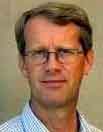 Professor Emil
Uddhammar
has been involved in a comparative research project on Development
and biodiversity in East Africa and India. The project
focuses on the impact different institutional arrangements – political,
legal and economic – had on bio-diversity and human development?
How has conservation and the economy of villagers living close to
protected areas changed over time? Four world-renowned protected
areas in Tanzania, Kenya and two states in India are studied, in
the project funded by the Swedish Research Council. In India Dr.
Uddhammar collaborates with Dr.
Vikram Dayal, Research Associate
at TERI, the Energy and Resources Institute
in New Delhi. More
information on the project.
Professor Emil
Uddhammar
has been involved in a comparative research project on Development
and biodiversity in East Africa and India. The project
focuses on the impact different institutional arrangements – political,
legal and economic – had on bio-diversity and human development?
How has conservation and the economy of villagers living close to
protected areas changed over time? Four world-renowned protected
areas in Tanzania, Kenya and two states in India are studied, in
the project funded by the Swedish Research Council. In India Dr.
Uddhammar collaborates with Dr.
Vikram Dayal, Research Associate
at TERI, the Energy and Resources Institute
in New Delhi. More
information on the project.
For some time, he has also been a visiting
professor at the University of Hyderabad, India. Emil
Uddhammar’s personal web page.
In November 2004, Uddhammar received a major three-years grant from
the Swedish Research Council for this project. More
information, with an abstract in Swedish.
In 2006, Emil Uddhammar became Professor in Political Science at the School
of Social Sciences, Växjö University. More
information on SASNET’s page about this department,
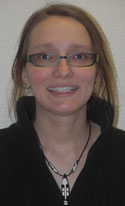 • Dr. Katrin
Uba entered the PhD programme
in 2002, and is being supervised by Hans Blomkvist. Her research is focused
on the outcome of different forms of political protests i.e. the impact
of social movement actions. Empirical material is related to campaigns
against privatization in Latin America (Peru), South Asia (India) and
Eastern Europe. She worked with a research project, funded by Sida/SAREC,
on ”The
impact of social movement actions – what makes them more effective.” Among
her India related publications, she wrote an article in 2005 titled ”Political
Protest and Policy Change: The Direct Impacts of Indian Antiprivatization
Mobilizations”;
and a 2005 conference paper from the European Sociologist Association
(ESA) 7th Conference, held in Torun, Poland, titled ”Anti-Privatisation
struggle in India”.
• Dr. Katrin
Uba entered the PhD programme
in 2002, and is being supervised by Hans Blomkvist. Her research is focused
on the outcome of different forms of political protests i.e. the impact
of social movement actions. Empirical material is related to campaigns
against privatization in Latin America (Peru), South Asia (India) and
Eastern Europe. She worked with a research project, funded by Sida/SAREC,
on ”The
impact of social movement actions – what makes them more effective.” Among
her India related publications, she wrote an article in 2005 titled ”Political
Protest and Policy Change: The Direct Impacts of Indian Antiprivatization
Mobilizations”;
and a 2005 conference paper from the European Sociologist Association
(ESA) 7th Conference, held in Torun, Poland, titled ”Anti-Privatisation
struggle in India”.
Katrin Uba defended her thesis titled ”Do
Protests Make a Difference? The Impact of Anti-Privatisation Mobilisation
in India and Peru” on Friday
1 June 2007. It focuses on the impact of various forms of political
protests in different contexts. The empirical material is related to campaigns
against privatization in Latin America (Peru) and South Asia (India). The
aim is to test and develope further the theory on social movement impact
on policy change. Faculty Opponent was Professor Anirudh Krishna, Duke
University, USA.
 Dr. Fiona Rotberg was previously connected to the Silk Road Studies Program, established at Uppsala University in 2002. At the Silk Road Studies Program, she was the Director for the research programme on Environmental Security in Asia. The purpose
of the project was to understand to what extent environmental
security issues contribute to intrastate conflicts and, ultimately,
state failure. Within the field of environmental security, this research
specifically analyzes the way that renewable natural resource scarcity
contributes to intrastate conflicts. Country case studies were used
for comparative analysis and to draw appropriate lessons learned for
policy makers.
Dr. Fiona Rotberg was previously connected to the Silk Road Studies Program, established at Uppsala University in 2002. At the Silk Road Studies Program, she was the Director for the research programme on Environmental Security in Asia. The purpose
of the project was to understand to what extent environmental
security issues contribute to intrastate conflicts and, ultimately,
state failure. Within the field of environmental security, this research
specifically analyzes the way that renewable natural resource scarcity
contributes to intrastate conflicts. Country case studies were used
for comparative analysis and to draw appropriate lessons learned for
policy makers.
Within the framework of the Environmental
Security in Asia project, a one day
forum entitled "Nepal
Water Security Forum" was arranged in Uppsala on Tuesday 27 March
2007 (more information). It
was organised by Dr. Rotberg in collaboration with Prof. Ashok Swain from the Dept. of
Peace and Conflict Studies, Uppsala University.
The results from the one day forum has been published as a book titled ”Natural Resources Security in South Asia: Nepal's Water”, a volume edited by Dr. Fiona Rotberg and
Dr. Ashok Swain. Go for the full book.
In October 2007, the Silk Road Studies Program moved from Uppsala to Stockholm, where it became an integrated part of the new Institute for Security and Development Policy (ISDP). Dr. Rotberg however decided to stay back at Uppsala University, being connected to the Dept. of Eurasian Studies during the period 2007-09.
Fiona Rotberg has also been editor for articles
on Environmental Security issues published by the World
Security Network, WSN (an international, independent,
nonprofit organization, the largest global elite network for foreign
and security policy). Dr. Rotberg’s
research focuses on natural resource scarcity and state failure. She
specializes in the roles that rule of law, community members, and cultural
issues play in managing environmental conflicts. Among recent South
Asia related articles are:
• Nepal:
Environmental Scarcity and State Failure (WSN 26 May 2006)
• Pakistan
and India’s Siachen Glacier: No Man’s Land
for Conservation and Peace (WSN 21 September 2006)
• The
world 's highest conservation battlefield: Conservation and security
collide in India and Pakistan's battle for a border glaciers (Asia Media, 18 October 2006)
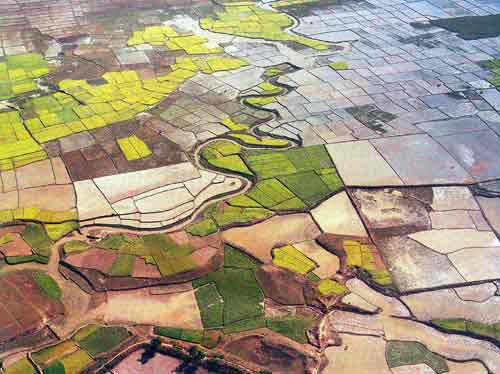 In November 2007, Dr. Rotberg received SEK 2.9 million as a three years grant (2008-10) from Sida's
Developing Country Research Council (U-landsforskningsrådet) for a project titled ”Humanitarian Challenges of Climate Change: The Role of Social
Networks in Promoting Resilience to Climate Variability”. More information about the 2007 Sida grants.
The project will be carried out in collaboration with Dr. Dalem Barman, Chairman at the Dept. of Peace and Conflict Studies, University of Dhaka, Bangladesh. It deals with the projected impact of climate change in South Asia with extreme flooding and thus food insecurity and humanitarian disasters in the form of famine and potentially mass migration. By studying the specific setting of flood-prone areas of Bangladesh, this research project will enhance our understanding of how people cope with and adapt to the impacts of current-day climate variability. The research question to be asked is: "how do social networks contribute to human adaptation to environmental variability in areas subject to extreme natural hazards?" Social networks, as facilitators of collective action, will be examined for how they have influenced livelihood resilience in societies repeatedly affected by extreme natural hazards. This knowledge is much needed to predict society’s vulnerability to future climate change and identify possible needs and options for adaptive action.
In November 2007, Dr. Rotberg received SEK 2.9 million as a three years grant (2008-10) from Sida's
Developing Country Research Council (U-landsforskningsrådet) for a project titled ”Humanitarian Challenges of Climate Change: The Role of Social
Networks in Promoting Resilience to Climate Variability”. More information about the 2007 Sida grants.
The project will be carried out in collaboration with Dr. Dalem Barman, Chairman at the Dept. of Peace and Conflict Studies, University of Dhaka, Bangladesh. It deals with the projected impact of climate change in South Asia with extreme flooding and thus food insecurity and humanitarian disasters in the form of famine and potentially mass migration. By studying the specific setting of flood-prone areas of Bangladesh, this research project will enhance our understanding of how people cope with and adapt to the impacts of current-day climate variability. The research question to be asked is: "how do social networks contribute to human adaptation to environmental variability in areas subject to extreme natural hazards?" Social networks, as facilitators of collective action, will be examined for how they have influenced livelihood resilience in societies repeatedly affected by extreme natural hazards. This knowledge is much needed to predict society’s vulnerability to future climate change and identify possible needs and options for adaptive action.
Dr. Anna Jarstad, also working at the Folke Bernadotte Academy, is now working on a research project entitled ”Opportunities and Obstacles: Local Ownership of Development and Stability in Northern
Afghanistan”. This three-year project (2010–12) is led by Dr. Louise Olsson, and identifies and analyzes the opportunities and obstacles in creating development and stability through local ownership with international support in Afghanistan. In focus is the international approach to work strategically to strengthen the structure, influence and effectiveness of the Government of the Islamic Republic of Afghanistan in the areas where Sweden plays an important role for the development and security, namely the Northern Afghan provinces of Balkh, Samangan, Jowzjan and Sar-e Pol. This project is conducted at Folke Bernadotte Academy. More information on Anna Jarstad’s research. ![]()
Exchange programme with Hyderabad University
Since 2002 the Department of Government has had an program
of teachers and students
with the Department
of Political Science at Hyderabad University in India. The exchange
is funded by a Linnaeus-Palme exchange Programme grant, see http://www.sasnet.lu.se/palmbevi04.html.
The collaboration involves exchanging a couple of faculty members for
three weeks periods every year, mainly for teaching on graduate and undergraduate
level, but also for presentation of research in seminars etc. From the
Spring semester 2005 two Masters students from each department also go
to the other department to take courses for one semester. These courses
will subsequently be included in the students' exam at the home university.
The next step forward has been to develop and find more common ground
between the two departments, both in terms of research and courses offered.
Prof. Prakash Sarangi,
chair of the Dept. of Political Science at the University of Hyderabad,
is the Indian counterpart in this exchange programme.
He is also Joint
director for the university’s so-called Study
India Program (SIP),
that runs educational programmes for many International institutions, amongst
them the the Nordic Centre in India consortium, NCI.
The collaboration project has got continued funding for the period 2009-10. More information about the South Asia related Linnaeus Palme projects for 2009-10. ![]()
Other South Asia related activities
On Monday 23 November 2009, PhD candidate Dipali Mukhopadhyay from the Fletcher School of Law & Diplomacy at Tufts University, Medford, MA, USA, gave a lecture at the department. It was entitled ”Warlord Governance in Balkh, Afghanistan”, and focused on politics and power in state-building from a provincial perspective in northern Afghanistan. The lecture was arranged by Uppsala Forum on Peace, Democracy & Justice. ![]()
As a graduate student, Dipali has held scholarships from the US Institute of Peace, Harvard Law School's Program on Negotiation and the US Department of Education as a Jacob K. Javits Fellow. Dipali completed her undergraduate studies at Yale University in the Political Science Department. Dipali's graduate work has taken her to Afghanistan many times since 2004, most recently in October-November 2009. Most recently Dipali published the paper, ”Warlords as Bureaucrats: the Afghan Experience” with the Carnegie Endowment for International Peace (August 2009).
Her research is grounded in a larger theoretical and historical argument. Her dissertation project deals with the impact of informal power on the state-building project in post-2001 Afghanistan, particularly on the role of warlord commanders turned-provincial governors, like Atta Mohammad Noor of Balkh Province.
SASNET - Swedish South Asian Studies Network/Lund
University
Address: Scheelevägen 15 D, SE-223 70 Lund, Sweden
Phone: +46 46 222 73 40
Webmaster: Lars Eklund
Last updated
2011-08-23
